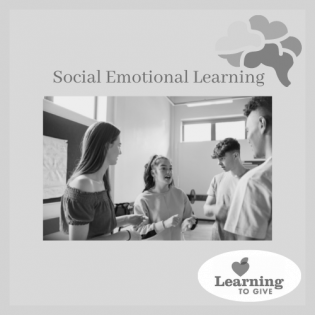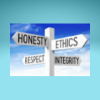Everyday SEL Reflection Prompts
Keywords:
Reflection
Relationship Skills
Responsible Decision-Making
Self-Awareness
Self-Management
Social Awareness
Social-Emotional Learning
YGFGinclusion
One of the most effective ways to support youth social emotional growth is with regular check-ins. Use ice breakers to give youth a chance to listen, talk, reflect, build empathy, and discuss critical thinking and issues. The following conversation prompts are organized by the SEL categories and the type of engagement they bring out.
SEL Connection:
The following reflection/discussion prompts are based on the five core social and emotional learning competencies:
- Self-Awareness
- Self-Management
- Social Awareness
- Responsible Decision-Making
- Relationship Skills
Warm-Up
Set some group norms for having safe and respectful conversations. Here are some sample community agreements.
- Make space for the voice of others.
- Be aware of power dynamics and speak up to share your voice.
- Be kind (civil) even if you disagree.
- Be curious and listen for understanding.
- Conflict can be hard, but it can be productive. Be brave and know that you'll get through it.
- Recognize that we all have blind spots. Be grateful when someone reveals your blind spots.
- Look for the common ground. What can we agree on? Common ground examples: we all want peace, comfort, and friends.
- Pay attention to how your body, mind, and spirit respond. This provides data about what is going on for you.
Activity Instructions
- Build a sense of personal identity and community mindedness through brief conversations about important things. The prompts below help facilitate exploration of self awareness and healthy social interaction with others.
- Use one prompt at a time. Take time, really listen, and follow through to demonstrate truly listening to youth and one another.
- Label a chart "Parking Lot" and display it in the room where anyone can add questions or ideas they want the group to come back to later. We can park ideas temporarily if they don't fit the current conversation.
Whole Group Discussion Vocabulary and Questions
Self Awareness and Self Management
- Identity and Emotions
- What are you afraid of? What are you not afraid of?
- What emotions scare you the most? Which emotions do you struggle to control?
- What makes you angry?
- If you had a switch to control your emotions, which emotion would you choose to turn on and off? Why?
- Write about a time when you used your emotions to create change?
- Write about a time when your emotions had a negative impact on your actions. What could you have done differently?
- How do your body, mind, and spirit provide data to tell you about what is going on?
- Personal Qualities and External Support
- What is your ethnic identity?
- What are your social identities?
- What events in your life have shaped you into who you are at this moment?
- How can you stand up for social justice?
- How often and in what ways do you talk to your family and friends about your identity?
- Do you feel comfortable talking to your family and friends about your identity? Who is the person you can go to for support at home?
- Who are your allies? Who is the person you can go to for support at school?
- Write a love note to your favorite character trait.
- What does “leadership” look like to you? What is not “leadership”?
- What does “support” look like to you? What is not “support”?
- How can you ask for help when you need it?
- Achieving Personal and Academic Goals
- Write about a time you wanted to give up on a goal or a dream. What happened?
- Write about a time you accomplished a goal or a dream. What happened?
- Write a letter to your past self. What should your past self know about the future? What would you advise your past self to do?
- Write a letter to your future self. What should your future self know about your present self? What would you advise your future self to do?
Social Awareness and Relationship Skills
- Feelings and Perspectives of Others
- Write about a time when you disagreed with a friend/family member and you handled it poorly. What could you have done differently?
- Write about a time when someone else's perspective changed your opinion.
- What is the benefit of having multiple perspectives on a subject?
- List five social issues that have impacted you and/or your community.
- List and describe three events in your life that have influenced how you relate to other cultures.
- Write a short story that has two perspectives of the same event.
- What are the stories you don’t know enough about and would like to know more of?
- What is your vision for “social justice”?
- Whose voices will you listen to when it comes to social justice?
- Whose voices have power?
- Individual and Group Similarities and Differences
- What privileges do my friends have?
- Would I ever be willing to give up my privileges for my friends?
- Imagine that you can trade places with a friend for a day. Which friend would you pick and why? Which friend would you not want to trade places with and why?
- Don’t judge a book by its cover. Write about a time where you judged someone based on their physical appearance. What happened? OR Write about a time where someone judged you based on your physical appearance. What happened?
- Write about a time where you made an assumption about someone's identity and you were wrong.What happened? How did you handle it?
- How can I use my privilege to help others?
- Communication and Social Skills for Effective Interactions
- How do you let others know how you feel?
- Write about a time where you were afraid to show others how you felt. How did you handle it?
- List and describe 3 words/feelings that come to mind when you think of group work.
- Do you believe group work should be mandatory? Why? Why not?
- Write about a time where you experienced a challenge with communicating with group members? How did you handle it? How could you have handled it?
- Constructive Conflict Prevention, Management, and Resolution
- Reflect on a time when you said something you regretted. Write about what you said, what you meant to say, and what you wish you had said.
- Write about a mistake you made when you chose to stand up and speak out. What can you do differently next time?
- Write about a time when you chose not to stand up or speak out. What can you do differently next time?
- Write a recipe for “Conflict Soup.” What ingredients do you need to resolve conflict?
Responsible Decision-Making
- Making Ethical and Safe Decisions in Civil Society
- Reflect on a time you had to make an important decision with very little time to think about the outcome.
- Recall a time when your choices were a matter of safety for yourself and/or others. How did you handle it?
- What happens if you don’t say anything? If you don’t take action? If you do nothing?
- What actions are you comfortable taking?
- What actions have you taken?
- What do you feel you can do to take action in community? What do you feel like you can’t do to take action in community?
- What support do you need from others to feel comfortable enough to take action?
- Imagine you have a social justice toolbox that you carry around with you. What’s in it and why?
- Making Responsible Decisions in Academic and Social Situations
- Someone in your school work group does not have their portion of the assignment complete after spending all hour on their cell phone playing games. How would you handle this situation?
- You see a friend erasing someone's name off of an assignment and writing their own name. How would you handle this situation?
- A group of kids is throwing things and laughing at students walking down the hall. What can you do in this situation?
- One of your classmates is attempting to snatch the hijab off of another classmate's head. What can you do in this situation?
- A classmate is refusing to use the correct pronouns for another classmate? How would you handle this situation?
- Your teacher is out and there's a substitute teacher in the class for the day. You have an assignment due at the end of the hour but the substitute teacher isn't paying attention to the students. How would you handle this situation?
- How do you choose who to work with on group assignments?
- Contributing to the Wellbeing of Others
- List three things you want in your school/community.
- List three things you want out of your school/community.
- Write a letter to the leader of your school with a list of the things you want to change for the better.
- Is your school a safe and inclusive space for everyone? How can you help make it a safe and inclusive space?
Self Reflection Writing Prompts
What are some conditions that help you feel safe or brave talking about important topics?
Wrap Up
Invite young people to write down their questions and thoughts in a journal.
Extension
Introduce the tools of courageous conversations with these two Learning to Give resources: Civil Conversations and Critial Conversations.










